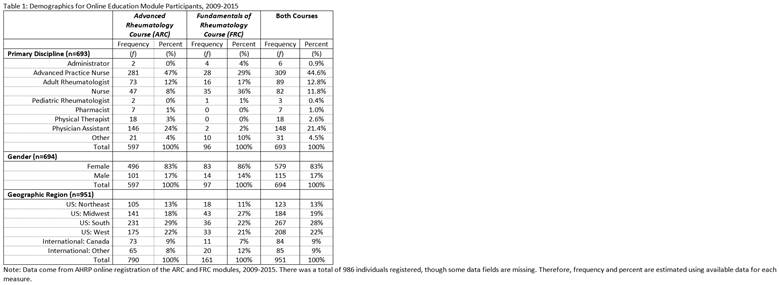Session Information
Session Type: ARHP Concurrent Abstract Session
Session Time: 4:30PM-6:00PM
Background/Purpose: Rheumatic diseases are complex conditions often affecting multiple organ systems needing treatment by expert health care providers. These providers function in multi-disciplinary teams for the most optimal patient outcomes. Significant rheumatology workforce shortages are prevalent and are expected to increase over the next decade. While rheumatologists receive rheumatology specific post-graduate training during fellowships, other health professionals have no formalized training pathway in rheumatology after completing their formal education. The ACR and the ARHP have recognized the need to provide rheumatology specific educational opportunities for health professionals who participate in the care of persons with rheumatic disease by creating online educational products. These online educational products are the Advanced Rheumatology Course (ARC), the Fundamentals of Rheumatology Course (FRC), and Rheumatology e-Bytes. These module based educational activities are intended to provide foundational, intermediate and advanced levels of content to meet the needs of health professionals with varying educational and career experience. The aim of this study is to describe the utilization of these educational products and summarize the feedback obtained from the ARC and FRC participants.
Methods: Data from ARC and FRC utilization and evaluations were obtained. Analyses of the available information were conducted. ARC participant data from December 2008 to December 2015 were reviewed. FRC participant data from October 2012 to December 2015 were reviewed. Rheumatology e-Byte data were not evaluated due to its recent release in January 2017.
Results: Since their debut, both the ARC and FRC have been highly utilized as evidenced by the geographic, gender, and profession diversity of learners. (Table 1) Those who have completed ARC and FRC modules have rated their participation in these activities as formative, aiding in their increase of confidence in assessing, managing, and evaluating persons with rheumatic disease. (Table 2) International rheumatology health professionals have also taken advantage of these quality educational tools.
Conclusion: The ACR and ARHP have capitalized on the advances in technology to provide enhanced learning opportunities to the rheumatology community. The ACR and ARHP online educational products have been successful in educating nurses, nurse practitioners, physician assistants and other health professionals.
To cite this abstract in AMA style:
Smith BJ, Graves K, Morgan T, Bancroft Rizzo D, Neuberger G, Dewing K, Deodhar AA, Hilliard R. Meeting the Needs of Rheumatology Health Professional Learners: the Success of the American College of Rheumatology (ACR) and Association of Rheumatology Health Professionals (ARHP) Online Educational Products [abstract]. Arthritis Rheumatol. 2017; 69 (suppl 10). https://acrabstracts.org/abstract/meeting-the-needs-of-rheumatology-health-professional-learners-the-success-of-the-american-college-of-rheumatology-acr-and-association-of-rheumatology-health-professionals-arhp-online-educa/. Accessed .« Back to 2017 ACR/ARHP Annual Meeting
ACR Meeting Abstracts - https://acrabstracts.org/abstract/meeting-the-needs-of-rheumatology-health-professional-learners-the-success-of-the-american-college-of-rheumatology-acr-and-association-of-rheumatology-health-professionals-arhp-online-educa/


